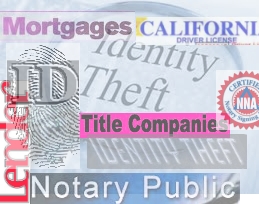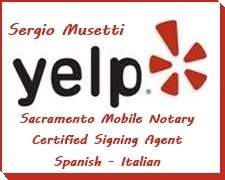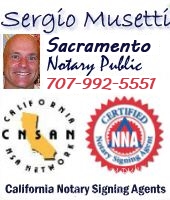Certified Loan Signing Agent - Spanish Translation - Apostille Service in California - Fingerprinting
Notarize your documents at your office or any location

Identity Theft: Identity theft is a form of stealing someone's identity in which someone pretends to be someone else by assuming that person's identity, typically in order to access resources or obtain credit and other benefits in that person's name. The victim of identity theft (here meaning the person whose identity has been assumed by the identity thief) can suffer adverse consequences if they are held accountable for the perpetrator's actions. wiki
References: Notary Learning Center |

Fraud and Identify Theft. Notary Public procedures
Notaries should follow their state procedures to validate the signer's identity. Some title, settlemen companies, lenders or banks my have different approach. These are a few notes regarding Indentity Theft Procedures.
To reduce the incidence of fraud and identify theft, proper identity verification must be
performed at every signing.
1. Validate the signer’s identity
Each signer must be present at the signing and must provide a valid government-issued, photo
identification.
Examples of government-issued identification
o valid driver's license from any U.S. State
o valid U.S. passport
o valid Foreign Passport
o valid Federal ID
o valid Green cards
o valid identification card issued by a federal, state or tribal government that contains the
individual's photo, signature and physical description.
This identification should contain a photograph, physical description and signature. Using
identification with these three components provides a basis of comparison with the
physical appearance and signature of the signer. Identification of this type also makes it
more difficult for a criminal to use a stolen ID.
To be considered valid, the identification cannot be expired.
A copy of any identification used at the signing must be returned to some title companies, settlement agent, lenders or banks if requested, with the closing package.
Be familiar with the laws governing identity verification in the state(s) where you practice.
If your state does not consider one of the listed forms of government -issued identification
as acceptable identification, you may not rely on it for identity verification.
2. Record the details of how you identified the signer in your notary journal
Record details of the type of identification used for identity verification in accordance with the
laws governing journal entries in your state.
3. if the signer does not have valid identification is always good to contact the Title company, signing agency or signing contact person to confirm the procedure to follow.
What is a Notary?
A notary is a public servant appointed by the state whose job is to guarantee that the signature on a legal document is valid by attesting that the signer “personally appeared” before them. They need to be an impartial, non-biased witness who checks the identification of the signer carefully, reviews each document thoroughly, and does not notarize deceptive or fraudulent documents.
The rise in identity theft and homeland security matters has caused the notary public’s role in the legal process to become even more significant in deterring document and identity fraud.
If you own a Business.
Safeguard your business identifiers.
Protect your business FEIN / EIN / TIN numbers as you would your own Social Security Number. Thieves can access or open many types of accounts with your business information. Keep all documents containing business information or business identifiers in a secure location and securely shred old or unnecessary documents that contain your business information.
Carefully review account statements as soon as you receive them.
Promptly notify the creditor if you discover any unrecognized or fraudulent transactions.
Keep your business computers and network secure.
Use regularly updated anti-virus / anti-spyware and internet security software, and restrict the use of your business computers to only business activities. Utilize WPA2 encryption to secure your business wireless network.
Regularly review your business credit reports.
Request copies of your business credit reports and review them for accuracy and suspicious activity:
Dun & Bradstreet 1-800-234-3867
Equifax 1-800-525-6285
Experian 1-888-397-3742
TransUnion 1-800-680-7289
Be alert for suspicious activity.
Misaddressed business mail, missing or late account statements or telephone calls and correspondence regarding unknown accounts are all potential indicators that something may be wrong. Thieves use haste, carelessness, and lack of attention to detail to their advantage. The longer you wait to follow-up, the more damage they can do.
Know your fraud liability limits and reporting requirements.
Under the Uniform Commercial Code (UCC), business banking accounts have shorter reporting time lines, fewer protections, and greater liability for fraud than consumer accounts. Your bank’s own policies can significantly impact your business’ liability for fraudulent transactions.
Consumer: Tips in mind to protect your identity
Pay attention when sharing personal information with others. Consumers should never give out Social Security Numbers or credit card account numbers over the telephone unless the person or company on the other end of the line is known by the consumer.
Photocopy all the contents of your wallet. This includes the fronts and backs of all credit cards. Keep this information in a secure location. If a wallet is stolen, notify the bank or issuer of each credit card as soon as possible. Each credit card has a customer service telephone number printed on it. By photocopying the cards, a record of all credit cards and account numbers, as well as the telephone number needed to call to cancel the cards are available. Do not carry identification containing sensitive information, such as a Social Security Number, unless absolutely necessary.
Review billing records. If a charge is not recognized, contact the creditor and question the charge. Also, notify the creditor if any bills do not arrive on time. A missing credit card bill could mean an identity thief has taken over a credit card account and changed the address to cover his/her tracks. Destroy all files containing Social Security Numbers, account numbers, and birth dates. Privacy advocates recommend using a crosscut shredder to shred documents and hard-drive shredding software to destroy a computer's hard drive before discarding a home computer.
Be aware when using automated teller machines. Always be familiar with the surroundings. Guard against people observing private ATM personal information numbers by using a free hand to shield the keypad. Also, do not use cordless telephones to conduct sensitive financial business. Eavesdroppers may be able to overhear the conversation.
If a victim:
The federal government provides valuable information as well as the steps to take in reporting the crime at www.consumer.gov/idtheft. There is also a universal ID Theft Affidavit used by many banks, credit card companies and other institutions. Consumers can download a copy of this form from the Federal Trade Commission's website, www.ftc.gov
If a credit card is stolen, notify the bank or credit card issuer immediately. Also, notify the local police and file a theft report. Finally, notify the three major credit reporting agencies (Equifax, Experian and Trans Union) and place a fraud alert on your name and Social Security Number. Sometimes an identity thief can strike even when consumers are being very careful. One of the best ways to catch identity theft is by ordering a copy of a credit report and checking it yearly.
Equifax:
1-800-525-6285 (report fraud)
1-800-685-1111 (to order credit report)
Experian:
1-888-EXPERIAN (to report fraud or order credit report)
Trans Union:
1-800-680-7289 (to report fraud)
1-800-916-8800 (to order credit report)
Recommended Notary Practices From
As a Notary Public, you are a Public Official bound by the laws of your State – and not by anyone else, including an employer, friend, associate or family member.
Always follow state law that requires the signer to be in your physical presence every time you notarize — without exception.
Always have the signature sacon the document affixed or acknowledged in your presence.
Always obtain identification that contains a photograph, physical description and signature.
Always keep a chronological record of the notarial act, including the signature of the signer in your journal, which must be kept in your custody and control at all times.
Always ask for a thumbprint of the signer in your journal to help protect against imposture.
Always confirm that the signer is not being coerced and is willingly signing the documents you notarize.
Always attach a Notary certificate if wording is not already printed on the document.
Always notarize only documents that are complete and without blank spaces.
Always use a seal when you notarize, and be sure to keep it in your custody and control at all times.
Always refrain from giving advice to signers unless you have the professional training and credentials to do so.
Products:
Ref. Ten -





